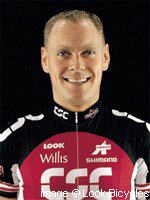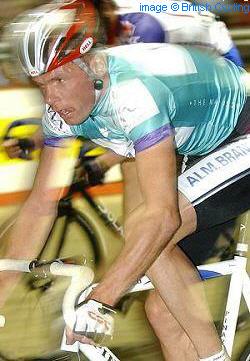Danny Kaye is telling me over the public address that it’s “Wonderful, wonderful Copenhagen”. I’m not so sure: it’s gone 1.00 am here at the The Copenhagen Six Day 2005 and we have 18 Lycra jerseys; 18 under-vests; six pairs of chamois-lined cycling shorts; six pairs of socks and six pairs of track mitts to hand wash, spin dry and hang up to dry in our ‘cabin’ in the bowels of the stadium. Welcome to the glamorous world of Six Day bicycle racing.
‘The sixes’, as they are known, start with Amsterdam in October and end here, with Copenhagen in February. In between there are events in Dortmund, Munich, Ghent, Rotterdam, Bremen, Stuttgart and Berlin. They are conducted by two or three man teams on steeply- banked in-door tracks.
The main elements of a six-day race are the ‘Madisons’, named after Madison Square Gardens, New York, where this form of racing originated. This is a relay race where one team, or a small group of teams try to lap the field.
The riders ‘change’ with a hand-sling, where one team member relays the other in to the fray with a powerful grabbing and thrusting of arms, conducted at speeds in excess of 35 mph. The winners will be the team on the ‘zero’ lap, with their opponents being laps ‘down’.
In the event of more than one team being on zero laps, then the race is decided on points, which are awarded for the other races which make up the programme. These can be sprint races, timed events or startlingly fast motorbike-paced races.
The sixes are hugely popular, most selling-out and are social, not just sporting affairs with restaurants, bars and cabaret. I’m here as a ‘runner’ to assist my friend Kris. I do the washing, prepare the food and generally ‘gofer’ for him and the riders he cares for.
Kris is a ‘soigneur’, a cycling term to describe a coach / masseur / dietician / father – confessor. He has enough on his plate and needs me to do the menial stuff.
It’s the last night. Everybody is happy, the contract fees get paid before the final session and we all go home tonight. Some of the guys have hardly been off the treadmill since Amsterdam in October.
“Are you going home to Belgium?” I ask one of the mechanics, every team has a mechanic to keep their sleek, fixed gear machines in perfect trim. “Yes, directly, as fast as possible”, comes the reply.
This six is the retirement race for Dane, Michael Sandstod. Sandstod was a good roadman. He won some big races, including numerous Danish championships. His last road race was in September, but he started his pro career at the Copenhagen six in 1993 and wants to end it in the same race.

The hardest working man at the six was Sandstod’s soigneur. Occasionally, during a Madison a rider will swoop down when he is ‘resting’ and grab a drink.
In some of the races it seemed that Sandstod was grabbing a bottle most laps, his harassed soigneur continually chasing abandoned bottles around the bottom of the track.
He’s a character though, and always has time to talk to humble runners like me. “How are you today Michael?” I enquire, the morning after one of his bottle-grabbing marathons. “Better than last night!” he replies with a laugh. His retirement presentation is a welcome break for the riders, who line the bottom of the track and applaud as Sandstod rides his lap of honour.
It’s 10.45 pm and time for the last 75 minute Madison. The powerful Belgian/Italian duo of Matt Gilmore and Marco Villa are leading, a lap clear of three other teams. Of the three teams they lead, home favourites Jimmy Madsen and Jakob Pil have the highest points total. The sixes have a reputation for being ‘arranged’, some even say ‘fixed’, but it’s not that simple.
Back in the 80s, one of the big German stars was riding his last six. He approached the small, elite group of riders who pull the strings. He said he wanted to go out in style and would pay handsomely for the win. He was told that money didn’t come into it: he didn’t have the form, the paying public knew that and there was no way he could win. That said — if a team does ‘have the legs’ and it’s political for them to win, well, that’s different. It’s not a difficult question, who would be the best winners of Denmark’s only six – two foreigners or two ‘home-boys’?

In the closing minutes Madsen launches the attack we are all expecting, Pil takes over as the well dressed and well oiled crowd stand on their sets and scream themselves hoarse.
It’s no easy lap gain and they have to fight hard for it. If you are an insider you can see what’s happening, the Big Guns are at maybe 95%, not ‘full-gas’ as the riders call it.
The old Belgian soigneur in front of us gives us a little back-pedalling gesture with his hands.
Despite this, most of the other teams are hanging on for dear life, it’s no cakewalk. The Danes look the part, sweat streaming from them, maintaining their form on the bikes — no nodding heads and swaying shoulders from these guys. The 70’s disco music pumps and the crowd noise rises to a crescendo as the gap between Madsen and the tail of the field narrows.
With minutes to go, Madsen rejoins the ‘bunch’, there’s no time for any other team to try to take the lap back — besides, it’s not in the script.
It’s all over, and the 2005 Copenhagen six has home winners. The little bubble I’ve been living in for days pops, I realise I haven’t a clue what’s happened in the outside world for the last week and I’m very, very tired.
Kirkcaldy suddenly seems inviting, but a long way away.



